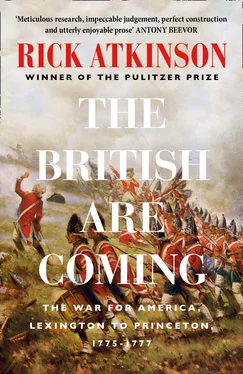Precisely how destitute became clear from the report laid before the war council that convened at Vassall House on Thursday, August 3. The earlier gunpowder estimate had erroneously included stocks used at Bunker Hill and in various prodigal skirmishes over the summer. Despite generous shipments to Cambridge from other colonies, the actual supply on hand, including the powder in all New England magazines, totaled 9,937 pounds, less than five tons, or enough for about nine rounds per soldier. Washington was gobsmacked. “The general was so struck that he did not utter a word for half an hour,” Brigadier General John Sullivan told the New Hampshire Committee of Safety. “Everyone else was equally surprised.” When he finally regained his tongue, Washington told his lieutenants that “our melancholy situation” must “be kept a profound secret.” This dire news, he added, was “inconceivable.”
More orders fluttered from the headquarters, along with desperate pleas. “Our situation in the article of powder is much more alarming than I had the most distant idea of,” Washington wrote Congress on Saturday. “The existence of the army, & the salvation of the country, depends upon something being done for our relief, both speedy and effectual.” Every soldier’s cartridge box was to be inspected each evening; some regiments levied one-shilling fines for each missing round. Civilians were asked “not to fire a gun at beast, bird, or mark without real necessity.” Even the camp reveille gun should be silenced. Desperate raids were contemplated, to Halifax or Bermuda. Pleading “the most distressing want,” Massachusetts requested powder from New York, which replied that it, too, was “afflicted and astonished,” with less than a hundred pounds for purchase.
A rebel schooner from Santo Domingo, in the West Indies, sailed up the Delaware River in late July under a false French flag with almost seven smuggled tons hidden in the hold beneath molasses barrels. Loaded into a half dozen wagons, the powder was promptly sent north with an armed escort. A second consignment of five tons soon followed, and by late August Washington had enough for twenty-five rounds per soldier, still a paltry amount. War could not be waged with an occasional smuggled windfall, yet not a single American powder mill existed when the rebellion began. Mills operating during the French war had fallen into disrepair or been converted to produce flour or snuff. Of particular concern was the shortage of saltpeter—potassium nitrate, typically collected from human and animal dung, and the only scarce ingredient in gunpowder. Identified as a strategic commodity in the medieval Book of Fires for the Burning of Enemies , saltpeter had been imported to Europe from India through Venice for centuries; imperial Britain bought almost two thousand tons a year. The saltpeter was kneaded with small portions of sulfur and charcoal, then pulverized, dusted, glazed, and dried to make gunpowder.
Saltpeter recipes soon appeared in American newspapers and pamphlets for patriots willing to collect the “effluvia of animal bodies” from outhouses, barns, stables, tobacco yards, and pigeon coops, preferably “moistened from time to time with urine.” Massachusetts offered £14 per hundred pounds, triple the price paid by Britain for Indian saltpeter. “I am determined never to have saltpeter out of my mind,” John Adams declared in October. “It must be had.”
Yet it would not be had in sufficient quantities to supply Washington’s magazines, which also lacked bayonets, good muskets, cartridge paper, bullet lead, and even shaped flints. In the next two years, at least 90 percent of American gunpowder, or the saltpeter to make it, would somehow have to come from abroad. For now, the shortage required “a very severe economy,” as one Washington aide wrote, curtailing tactical operations and imposing a quiescent status quo on the siege of Boston. By early fall, virtually all American cannons had fallen silent but for a single 9-pounder on Prospect Hill, fired occasionally in ornery defiance.
As Washington grappled with his powder problems, another shock jolted the American camp. On Tuesday, October 3, nine generals gathered for a war council with the commander in chief in a large front room at Vassall House. Outside the south windows, autumn colors tinted the elm trees, and the distant Charles glistened with a pewter hue. Wasting no time, Washington informed the council that an anonymous, encrypted “letter in characters,” addressed to a British major, had been intercepted in Newport, Rhode Island, and brought to the Cambridge headquarters. The original courier, a woman described by her former husband as “a very lusty woman much pitted with smallpox,” had been apprehended and bundled to Cambridge on the rump of a horse for interrogation.
Washington dramatically placed the pages on a table. An unbroken, nonsensical sequence of letters covered the first sheet for twenty-six lines, then spilled onto a second page. After the letter’s capture, he said, two copies had been sent for decipherment to trusted men with a knack for puzzles. This code substituted a different letter for each letter in the alphabet; it could be solved by identifying the most frequently used symbols in the cipher and assuming they represented the most common letters in English, starting with e , then t , then a , then o , and so forth. Both decryptions had been completed the previous night, and the solutions were identical.
Washington laid one of the translations before his lieutenants. The letter, more than 850 words long, provided details on American strength, artillery in New York, Bunker Hill casualties, troop numbers in Philadelphia, ammunition supplies, and recruiting. “Eighteen thousand brave & determined with Washington and Lee at their head are no contemptible enemy,” the writer had advised. “Remember I never deceived you.… A view to independence grows more and more general.… Make use of every precaution or I perish.”
From clues in the letter and a confession extracted from that lusty, pitted courier the secret author had been identified as Dr. Benjamin Church, recently appointed as the army’s surgeon general. He had been arrested, Washington said, and was confined to a room on the second floor of his hospital headquarters, just down the street from Vassall House. A search of his papers had yielded no incriminating evidence.
The next day, Dr. Church—forty-one, florid, and impeccably tailored—appeared under guard before the war council. He seemed an unlikely turncoat. A Mayflower descendant, Harvard-educated and medically trained in London, a writer of elegy and satire who could quote Virgil in Latin, he was an expert on smallpox inoculation, a physician for the public almshouse, and a radical firebrand who had performed the postmortem examinations of Boston Massacre victims. As a member of the Committee of Safety, he had supported Benedict Arnold’s attack on Ticonderoga and personally escorted Washington into Cambridge three months earlier. True, he had long had a reputation for high living—“much drove for money,” it was said—with a fine house in Boston, a country estate, and various mistresses.
Church quickly admitted authorship, but he insisted the letter was a ruse “to influence the enemy to propose immediate terms of accommodation.” His intent, if foolish and indiscreet, was to gull “the enemy with a strong idea of our strength” in order to forestall a British attack. Little information had been disclosed that Gage’s officers could not read in the newspapers. “I can honestly appeal to heaven for the purity of my intentions,” Church insisted. “I have served faithfully. I have never swerved from my duty through fear or temptation.” After questioning from each general, he was dismissed and marched back to confinement.
Читать дальше












